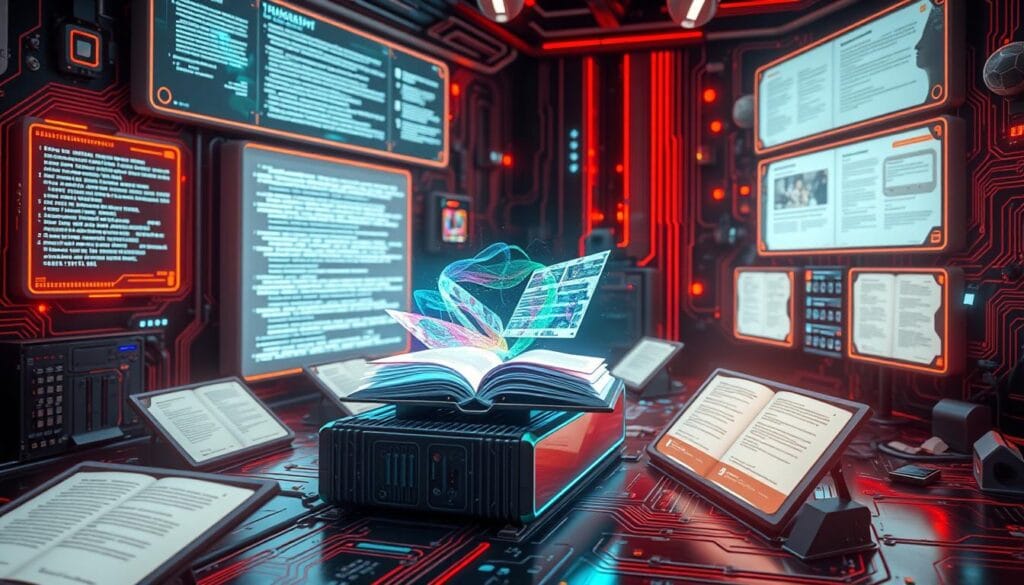“The question isn’t whether you might be able to use AI to write a book. It’s whether you will lean on its strengths while embracing your unique voice.” — Unknown
As technology advances, the literary world faces a pressing question: Can ChatGPT 4 write a book? OpenAI’s ChatGPT 4 boasts writing capabilities that span from short tales to full manuscripts. Its growing fame indicates that many are using it to overcome writer’s block, starting with initial ideas that they later enhance (ChatGPT has gained popularity among users, with many turning to it to generate content, stories, and even book ideas.)1. Yet, while Using ChatGPT 4 to write a book might ease the writing process, authors must stay involved. AI lacks the creativity and emotional depth that make human stories impactful. Although ChatGPT produces grammatically correct text, it cannot match the complexity and originality found in human narratives (ChatGPT scrapes the internet for content, potentially including copyrighted material, leading to concerns about the originality and quality of the generated content.)1.
Exploring ChatGPT 4’s capabilities and limitations is essential. We must consider not just the technological aspects but also the ethical implications regarding copyright and content originality.
Key Takeaways
- ChatGPT 4 can generate book ideas and provide outlines, but human authorship remains vital.
- Authors must navigate copyright issues when integrating AI-generated content into their works.
- AI can assist in planning and character development but lacks unique storytelling depth.
- Collaboration with AI should be a balance between automation and personal creativity.
- Amazon has policies in place regarding self-publishing AI-generated works, requiring disclosure.
- Despite its capabilities, AI-generated content is often criticized for lack of authenticity.
Understanding ChatGPT 4’s Capabilities
ChatGPT 4 marks a major leap in natural language processing technology, enabling users to delve into AI book writing with ChatGPT 4. This tool brings a range of features that streamline the writing process. It allows authors to explore their creativity more freely. Its capacity to generate pitches for stories across genres enriches the brainstorming phase, offering multiple ideas to choose from2.
Overview of Natural Language Processing
At its core, ChatGPT 4 relies on advanced natural language processing algorithms. These algorithms use deep learning models and vast datasets to grasp, interpret, and create text that mimics human speech. With 100 trillion parameters, it surpasses GPT-3’s 175 billion parameters, demonstrating a significant leap in AI capabilities3.
The Technology Behind ChatGPT 4
ChatGPT 4’s architecture is built on a complex neural network. This structure enables it to maintain context and coherence in extended conversations. It boasts short-term memory capabilities, ranging from 64,000 to 128,000 words, enhancing user interaction3. However, its complexity also presents challenges. Authors often need to refine the AI-generated content, as it might lack depth or originality in character development and plot creation2.
Limitations of AI in Creative Writing
ChatGPT 4’s capabilities in creative writing are impressive but limited. It can help generate detailed synopses and character arcs, yet significant editing is required for a coherent and engaging narrative2. The writing process it facilitates involves multiple iterations, including refining details and enhancing quality. This underscores the critical role of human input in the creative journey4.
The Writing Process Explained
Grasping the complexities of the writing process is crucial for any budding author. The ChatGPT 4 book writing process introduces innovative tools to simplify this journey. It spans from initial planning to the final draft. Authors using ChatGPT’s writing structure can refine their storytelling, crafting a narrative that deeply connects with readers.
Planning and Structure of a Book
Effective writing starts with thorough planning. ChatGPT helps in crafting outlines that detail each chapter, enabling authors to see their book’s structure. This method helps organize thoughts and weave a coherent plot.
The Role of Research in Writing
Research is key to effective writing. It adds authentic details that draw readers in. ChatGPT offers quick access to information, making it easy to integrate relevant data into the story.
Character Development and World-Building
Creating compelling characters is essential for any story. ChatGPT aids in brainstorming unique traits, backstories, and motivations, boosting the narrative’s emotional depth. It also aids in world-building, creating settings that capture readers’ imaginations. A well-built world and deep characters enhance the reader’s experience, making the story more captivating5.
Writing Style and Voice
Consistency in writing style and voice is crucial. ChatGPT helps authors develop their unique styles by suggesting options that match their preferences. Through guided prompts, writers can explore different tones and voices, encouraging creativity while staying true to their individuality.
ChatGPT is recognized for its ability to adapt to various writing prompts, helping authors create diverse narrative voices.
By integrating these elements with a strategic approach, authors can create a richer storytelling experience. This makes the ChatGPT 4 book writing process an invaluable tool for writers67.
How ChatGPT 4 Approaches Writing a Book

ChatGPT 4 takes a systematic approach to drafting books, showcasing its prowess in content generation. It excels in generating innovative plot ideas and character concepts, aiding authors in brainstorming sessions8. The platform also provides feedback on writing style, grammar, and coherence, enhancing manuscript quality8.
Generating Ideas and Concepts
ChatGPT assists aspiring authors in defining their book’s genre and theme. By using tailored prompts, writers receive more precise responses from the AI, leading to better idea generation9. This feature is highly beneficial, aiding in brainstorming book ideas and character development, thus facilitating the creative process.
Providing Detailed Outlines
The AI excels in outlining key plot points, chapters, subplots, conflict, and tension in narratives. Authors can derive structured outlines that serve as blueprints for their work, enabling them to visualize their story’s progression8. Such detailed outlines are crucial for organizing thoughts and ensuring logical flow throughout the narrative, thus saving valuable time for the author.
Drafting Chapters and Sections
While ChatGPT cannot produce an entire novel in one sitting, it plays a crucial role in drafting individual chapters and sections. Authors can rely on the AI’s ability to improve their writing by enhancing coherence and clarity9. This tool serves as a significant research companion for summarizing information, which can enrich the author’s content, especially when integrating factual data or complex themes.
With its support, professionals can better align their writing with their vision for the book, ultimately leading to a polished final product89.
Genres That ChatGPT 4 Can Explore
ChatGPT 4 emerges as a versatile tool for AI book writing across genres. It adeptly navigates through various literary styles, offering a unique approach to storytelling. As it delves into fiction, non-fiction, and poetry, it becomes a valuable ally for writers. This AI technology boosts creativity and productivity, making it a standout choice for ChatGPT 4 for book creation.
Fiction: Novels and Short Stories
In fiction, ChatGPT 4 shines by generating compelling plot ideas, character arcs, and dialogue. It facilitates rapid brainstorming, helping authors develop novel concepts or short stories that engage readers. Its ability to blend creativity with practicality makes it a compelling option for ChatGPT 4 for book creation.
Non-Fiction: Essays and Guides
In non-fiction, ChatGPT 4 aids in crafting structured essays and informative guides on diverse topics. It provides relevant research and constructs coherent narratives, aiding authors in delivering valuable content. This showcases the AI’s adaptability across the writing spectrum.
Poetry: Rhymes and Free Verse
For poetry enthusiasts, ChatGPT 4 offers a unique perspective by crafting verses in both traditional rhymes and free verse. It fosters imaginative expressions, simplifying the process for poets to overcome creative barriers. While its flexibility is noteworthy, human touch is essential for adding emotional depth to poetic works.
However, it’s crucial to acknowledge its limitations. Feedback indicates that while many appreciate its quick content generation, challenges like a robotic tone and poor organizational structure can occur when writing complete books1011.
Collaborating with ChatGPT 4

The writing world is transforming with the advent of advanced AI systems like ChatGPT 4. This innovation opens up new avenues for authors looking to explore *Human-AI collaboration in writing*. Such collaboration can greatly improve the writing process, especially in book authoring and editing with ChatGPT 4. It combines human creativity with AI’s efficiency, leading to a more dynamic approach to creating content.
Co-Writing with AI: A New Trend
Writers engaging in co-writing with ChatGPT gain access to a tool that excels in generating ideas and refining drafts. ChatGPT performs best when editing 3-4 paragraphs at a time, ensuring narrative flow and thematic consistency. However, writers may need to manually reorder text for optimal results, ensuring the content stays focused and directed12.
Human-AI Collaboration Dynamics
The partnership between human authors and ChatGPT is built on clear communication. When writers provide specific guidelines, ChatGPT can adjust its tone to fit various styles. This flexibility allows for a wide range of outputs, appealing to different audiences while keeping core ideas intact12.
Feedback and Revisions with ChatGPT 4
Effective collaboration hinges on feedback and iterative revisions. Writers can improve ChatGPT’s responses by giving examples and reiterating instructions, enhancing the quality of revisions. However, using AI for book writing raises questions about copyright, as AI-generated content is typically outside copyright protection. This prompts authors to consider ownership and creative contribution critically13.
Quality Control in AI-Generated Text

In the world of AI-generated writing, having strong quality control is key to reaching professional levels. It ensures the content is clear and engaging, making it easier to connect with readers.
Editing and Proofreading Essentials
Editing AI text means checking for grammar mistakes, clarity, and style consistency. This step refines the writing and makes sure it matches the intended message and audience’s expectations.
Ensuring Coherence and Consistency
Editors must review the narrative structure and character development to keep the story coherent and consistent. AI content can sometimes have gaps. A clear framework with specific guidelines helps align the text, improving its readability.
Utilizing Human Editors for Final Touches
Human editors are essential for the final stages. They understand storytelling and audience dynamics better than AI. Their input is critical for meeting publishing standards and addressing AI-generated content risks1415.
The Benefits of Using ChatGPT 4 for Writing

ChatGPT 4 offers significant advantages for writers aiming to refine their skills. It notably enhances speed and efficiency in content creation. For example, writing a 40-page Kindle book titled “Brain Sharpeners: 48 Natural Foods That Support Brain Health” took only two days. This showcases ChatGPT 4’s effectiveness in boosting writing efficiency1617.
Speed and Efficiency in Content Creation
ChatGPT 4 handles about 90% of the writing process, including research and initial drafts. This frees up time for authors to concentrate on the big picture. They can refine their ideas with the AI’s data-driven suggestions16.
Accessibility for Aspiring Authors
ChatGPT 4’s accessibility empowers many aspiring authors who face traditional writing hurdles. It provides immediate help, bridging the gap between talent and experience. This AI can also generate promotional content, like 20 tweets for a book launch, boosting visibility and engagement16.
Overcoming Writer’s Block with AI Support
Writer’s block can be overwhelming, but ChatGPT 4 offers effective solutions. It suggests ideas and creative prompts, sparking inspiration. Despite concerns about originality and emotional depth, combining human intuition with AI can create compelling stories17.
Case Studies: Successful AI-Generated Works

The exploration of Successful AI-generated books reveals how AI models, like ChatGPT 4.0, have transformed the literary landscape. Authors have pushed AI’s limits, creating stories that captivate readers. This journey showcases AI’s role in shaping new narratives.
Notable Books Inspired by AI
ChatGPT 4.0 has been used to recreate works by Jane Austen and Mark Twain. These efforts, such as reimagining “Pride and Prejudice” and “Adventures of Huckleberry Finn,” demonstrate AI’s ability to preserve original tones. They also highlight AI’s potential in generating new content that blends seamlessly with classic narratives18. The history of AI in writing dates back to the 1950s, illustrating its growth into a sophisticated tool18.
Hits and Misses in AI Authorship
AI models, including ChatGPT, have produced remarkable Successful AI-generated books. However, challenges persist in maintaining consistent tone and capturing an author’s unique voice. Discrepancies between AI-generated writing and the original style have led to critiques19. Yet, authors like Sheila Heti have explored AI’s creative potential and limitations through dialogue19.
Critiques and Praise for AI Contributions
The debate surrounding critiques of AI writing raises ethical concerns, including copyright issues. Critics emphasize the need for human touch in storytelling, despite AI’s ability to create coherent narratives20. Despite these challenges, the future of writing appears bright, with AI aiding authors in their creative endeavors18.
Ethical Considerations in AI Writing

Artificial intelligence’s growth introduces critical ethical concerns in AI writing. The use of AI tools, like ChatGPT, in writing raises questions about copyright issues with AI-generated content and the authenticity of human versus AI contributions. Authors can leverage AI to aid in writing and editing, blending technology with creativity21. However, many feel uneasy about using AI for writing, highlighting mixed emotions and moral dilemmas within the writing community22.
Copyright and Ownership Issues
Ownership of AI-generated content is a complex issue. Authors stress the need for authenticity, believing content should reflect personal experiences and insights rather than AI text22. As AI’s role grows, copyright and ownership laws could significantly change. Traditional publishing often lacks fact-checking, adding to the complexity of ownership21.
Authenticity: Author vs. AI Contributions
The authenticity of AI contributions is a topic of ongoing debate. Writers are advised to keep their unique voice while using AI for efficiency22. Some view AI as a legitimate aid, akin to spell check, making it more accepted in creative work22. However, ethical concerns arise when AI work is presented as original without proper credit, potentially leading to academic misconduct23.
The Future of Writing in the Age of AI
The future of writing with AI offers both opportunities and challenges. As generative AI becomes more widespread, educators must teach the ethical aspects of their fields23. It’s essential to use technology responsibly, ensuring it enhances creativity and productivity without replacing genuine thought22.
The Reader’s Perspective on AI-Generated Books

Authors and publishers need to grasp how audiences view AI-generated literature. The reception of AI-produced works is mixed, with many readers questioning their quality and authenticity. Currently, many agents and publishers in the book industry show little interest in AI-generated books, opting to reject them24. This situation prompts questions about reader engagement in AI literature and the role of trust in accepting these new creative forms.
Reception of AI-Produced Literature
Readers face a dilemma when encountering AI-generated content. Studies reveal that AI can create coherent, lengthy content swiftly but often falls short in quality and enjoyment25. Thus, the critical reception of AI-generated literature is crucial for its success. Personalized content, a benefit of AI writing, may improve reader experiences. Yet, doubts about the narrative’s authenticity persist.
Reader Engagement and Trust
Trust is essential for engaging readers with AI literature. Although Amazon allows AI-generated books, with the need for disclosure, concerns about copyright and originality are widespread25. Moreover, addressing bias in AI-generated content is vital to prevent stereotypes and maintain trustworthiness24. As readers explore this new terrain, fostering a credible conversation is key to strengthening their bond with AI authors.
Personalization in AI Writing
The success of AI in writing hinges on its ability to augment human creativity, not replace it. When authors leverage AI for brainstorming and outlining, it can enhance creativity while preserving the uniqueness of storytelling25. Despite the challenges, encouraging readers to embrace AI-generated content can lead to diverse, enriching reading experiences. Quality content that resonates with readers remains the cornerstone of AI-generated content reception in the ever-changing literary world.
Future of AI in the Publishing Industry

The publishing world is rapidly changing with the advent of AI. Writers and publishers are discovering how AI tools can transform their work. The future of AI in publishing looks promising, with innovations that could change how we create and enjoy literature. AI-led authorship is not just about automating writing; it’s about a fundamental shift in how we collaborate and produce content.
Trends Shaping the Future of Writing
Tools like GPT and Generative Pre-trained Transformers are revolutionizing writing and content creation. They’ve led to significant gains in efficiency and productivity26. The Washington Post’s Heliograf and OpenAI’s GPT are already producing a wide range of content, from news to poetry. This shows the vast potential of AI in various writing formats26. Future trends include AI-driven content recommendations, enhancing reader engagement and satisfaction26.
Impact on Traditional Publishing
AI’s influence is clear in traditional publishing, bringing both challenges and opportunities. Critics worry that AI-generated content lacks the emotional depth of human writing, raising concerns about literary quality27. However, AI’s capacity to produce vast amounts of content quickly can streamline the publishing process, boosting efficiency28. AI can also help authors with character development and plot ideas, speeding up the writing process26.
Opportunities for New Writers
The future looks promising for new writers, thanks to AI tools that make publishing more accessible. These tools enable writers to produce high-quality content quickly, making entry into the publishing world less intimidating27. Platforms with AI technology offer new authors a chance to improve their skills through instant feedback on style and grammar. This continuous improvement helps them grow as writers26. AI also helps generate new ideas, allowing fresh voices to enter the market and cater to diverse readers26.
Skills Writers Can Develop Using ChatGPT 4

ChatGPT 4 can greatly improve a writer’s skills, leading to significant advancements in several areas. This AI tool offers many benefits, from boosting creativity to enhancing research and refining writing techniques. It’s a powerful tool for writers looking to grow.
Enhancing Creativity Through AI Tools
ChatGPT 4 unlocks a world of creativity for writers. It can generate ideas, helping authors explore new concepts they might not have considered. This AI model presents unique perspectives, encouraging a broader thought process. It’s a great way to boost creativity in writing.
Research Skills Leveraged by AI
Research is crucial for writers, and ChatGPT 4 makes it more efficient. It quickly gathers relevant information, saving time and effort. Using ChatGPT 4 for research helps develop productive habits, improving both speed and accuracy.
Improving Writing Techniques with Feedback
Feedback is essential for improving writing techniques. ChatGPT 4 offers instant feedback and suggestions, pointing out areas for improvement. This feedback loop allows writers to refine their work, resulting in a polished final product. It’s a powerful tool for growth and transformation in writing.
ChatGPT 4 as a Learning Tool for Authors

ChatGPT 4 has become a crucial tool for authors aiming to improve their writing skills. It offers insights into various writing mechanics, helping writers enhance their abilities. This AI tool provides authors with a platform to refine their narrative skills and tackle the complexities of modern storytelling.
Gaining Insights into Writing Mechanics
ChatGPT’s advanced algorithms provide a structured approach to writing. It aids in brainstorming, character development, and outlining stories. The AI-generated suggestions spark creativity, offering perspectives that might not be considered otherwise5. It not only crafts compelling stories but also establishes a solid foundation based on proven writing principles10.
Learning from AI-Generated Suggestions
Authors facing writer’s block or looking to explore new themes benefit from ChatGPT. It generates ideas, suggests character names, and proposes plot twists. The feedback on style and flow encourages experimentation, leading to more original work29. This dynamic interaction makes learning a continuous journey.
Using AI for Skill Improvement
ChatGPT 4 helps authors identify their strengths and weaknesses. It assists in editing by pointing out grammar issues and suggesting improvements10. Additionally, its research capabilities allow writers to delve into new genres and add factual accuracy to their stories. The integration of ChatGPT promotes an ongoing dialogue between authors and AI, continually improving the writing craft5.
Integrating ChatGPT 4 in Writing Routines

Adding ChatGPT 4 to your writing routine can boost productivity. A well-organized workflow that leverages AI can streamline your creative process. This lets you concentrate on crafting compelling content. ChatGPT 4 excels at refining ideas and highlighting the value of your initial spark.
This collaboration sparks a productive exchange, driving innovation and creativity.
Establishing a Productive Workflow
Developing a structured writing routine is key to maximizing ChatGPT 4’s benefits. Many writers, 23%, already use generative AI in their work30. The tool’s language analysis and suggestions can improve clarity and impact. It aids in outlining story beats and spotting plot holes, ensuring engaging narratives.
Setting Goals with AI Assistance
Setting realistic goals is essential for authors. AI tools help analyze writing patterns, setting achievable deadlines30. ChatGPT 4 aids in maintaining focus by creating detailed character profiles and plot suggestions. This strategic AI use makes reaching writing goals more feasible.
Balancing AI Input and Personal Creativity
It’s crucial to balance AI-generated ideas with your personal creativity. AI can spark new ideas and help overcome writer’s block. Yet, keeping your unique voice in the narrative is vital. Use ChatGPT 4 for brainstorming while ensuring your style shines through.
This balance creates a rich, immersive story, keeping you central to your creative journey31.
Conclusion: The Future of Writing with ChatGPT 4
The writing world is undergoing a significant transformation, with AI emerging as a valuable writing companion. This shift opens up new avenues for authors to refine their creative processes. By embracing AI, writers can delve into innovative storytelling techniques, utilizing ChatGPT 4 to enhance their craft. This integration not only preserves their unique voice but also boosts productivity and creativity, benefiting the literary sphere as a whole.
Embracing AI as a Writing Companion
AI’s capabilities, such as generating extensive texts, signal a new chapter in creative writing32. It enables authors to explore fresh ideas and refine their writing style, ushering in a collaborative era. For example, the author of “Enhancing Your Creative Potential” wrote a 34,000-word book in just three months, with significant AI assistance33.
The Evolving Role of Writers in AI Collaboration
Despite concerns about AI’s potential to homogenize creativity, experts believe it could spark new experimentation, akin to photography’s impact on painting32. This could result in raw, personal narratives that stand out in the digital age. Rather than being replaced, writers are empowered with AI tools to express themselves more vividly in today’s literature.
Final Thoughts on AI’s Impact on Literature
The true impact of AI on literature depends on how authors choose to integrate it. As discussions around generative AI intensify, especially during NaNoWriMo, addressing inclusivity is crucial. Yet, AI’s potential to democratize writing is undeniable. The future looks promising for those who see ChatGPT 4 as a partner, leveraging its capabilities while maintaining the essence of human storytelling.
FAQ
Can ChatGPT 4 write a book entirely on its own?
How does ChatGPT 4 assist in the writing process?
What are the limitations of using ChatGPT 4 for book writing?
Can ChatGPT 4 write in different genres?
What role does human collaboration play when using ChatGPT 4?
How important is editing in AI-generated texts?
What benefits does ChatGPT 4 offer to aspiring authors?
Are there any ethical considerations to be aware of when using ChatGPT 4?
How do readers perceive literature generated by AI?
How is AI influencing traditional publishing models?
Can writers develop their skills using ChatGPT 4?
How can authors integrate ChatGPT 4 into their writing routines effectively?
Source Links
- Can ChatGPT help you write a book? Here’s why not!
- How to Write a Novel With ChatGPT: My 6 Step Process
- How to Use ChatGPT-4: A Comprehensive Guide
- Generating a full-length work of fiction with GPT-4
- How to Write a Book in ChatGPT: My Complete Process
- Can ChatGPT Write My Book? (Step-By Step Process)
- Writing My First Book, Hoping to Find Out How ChatGPT Can Help
- Unlock the Secrets of How to Write a Book with ChatGPT
- How to Write a Book With ChatGPT – Basmo
- Can You Legally Use ChatGPT to Write a Book
- How to Write a Book with ChatGPT
- Maximizing Your Collaboration with ChatGPT: Tips and Tricks for Working with Your New Writing Partner
- Can ChatGPT Write My Book?
- A Publisher’s Statement Regarding AI-Written Submissions
- Technique for Writing Entire Books
- I wrote and published a Kindle book in one weekend, with GPT-4.
- Using ChatGPT to Write the Short Book: Sharing the Journey – Sailing Sweet Ruca
- Can ChatGPT 4.0 Recreate a Book | Unveiling AI’s Literary Genius
- Confessions of a Viral AI Writer
- Create Case Studies with ChatGPT: Prompts and Best Practices
- Mini-Series: Ethical Ways Authors Can Use ChatGPT When Editing | She Writes
- Is Writing a Book With AI Unethical?
- Ethical use of AI in writing assignments
- ChatGPT and Publishing: 3 Ways Publishers Are Responding to AI — Alyssa Matesic | Professional Book and Novel Editing
- Can AI Write Books? 4 Things to Know About AI, Books & Novels
- The Next Page: AI’s Revolution in Publishing
- Are AI Authors the Future of Book Publishing?
- AI and Publishing’s Future
- Can I Use ChatGPT to Write a Book? 7 Better Writing Ideas
- Master Novel Writing with ChatGPT A Comprehensive Guide
- Writing Fiction with ChatGPT 4: A Step-by-Step Guide
- ChatGPT is great at summarizing books. But will AI ever write a true work of literature?
- How I Wrote My New Book With ChatGPT







